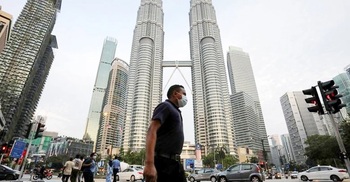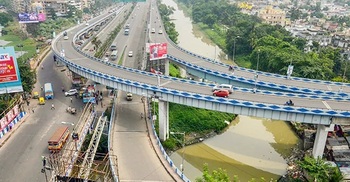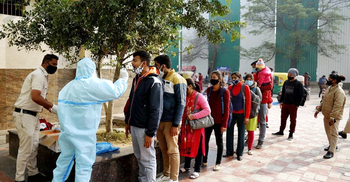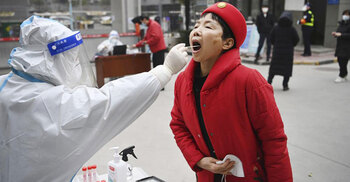Hong Kong scraps flights, shuts bars, gyms
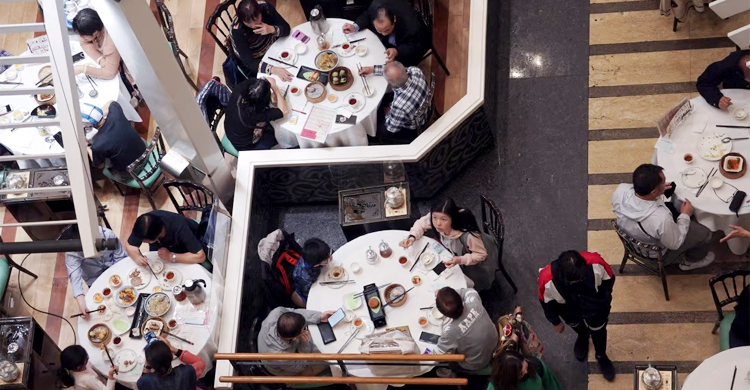
Hong Kong is imposing strict new virus control measures for the first time in almost a year as the highly transmissible omicron variant seeps into the community and threatens to spur a winter wave.
The city will ban dining-in after 6 p.m., close some venues including bars and gyms, eliminate large-scale events and halt all flights from eight countries, Hong Kong Chief Executive Carrie Lam said at a briefing on Wednesday. The new rules return to social distancing restrictions that were in place a year ago and eased after Chinese New Year in 2021 when infections were ebbing.
The eight countries from which no people or flights will be allowed to arrive for the next two weeks are Australia, Canada, France, India, Pakistan, the Philippines, the UK and the US, places with the worst omicron spread currently, Lam said.
The tightening comes as the Asian financial hub this week reported the first local coronavirus case that officials can’t trace to its source. The patient, an unvaccinated man who developed symptoms before being diagnosed, is believed to be carrying the omicron variant that has triggered an exponential spread of Covid-19 across the globe.
The government is acting quickly in an effort to prevent that from happening in Hong Kong, which is uniquely vulnerable because of low vaccination rates.
“We have to grasp this very critical moment,” Lam said. “We have to contain the pandemic to ensure that there won’t be a major outbreak in the community again. In a sense, we are racing with omicron.”
Hong Kong is one of the only places in the world that hasn’t experienced a delta outbreak. It has maintained a strict Covid Zero policy, designed to eliminate all traces of the virus within its borders. The arrival of omicron, which triggered the first local transmission in nearly seven months, is testing the limits of its power.
The city will endure a natural experiment as the virus, which has mutated to become even more infectious, tries to continue spreading despite the mitigation measures that the world has developed in an effort to control it. Hong Kong is hampered by one of the lowest vaccination levels among developed economies, especially among the elderly. And of the 62% that have been vaccinated with two shots, many are relying on a less potent shot made by China’s Sinovac Biotech Ltd.
The growing number of omicron cases and a looming expansion of the vaccine mandate has enlivened the city’s stagnant immunization rollout. About 18,000 initial injections were administered on Tuesday, the most in four months and nearly quadruple the number given a week earlier.
Just 22% of the over-80 population is vaccinated, a stark contrast to other places where the vulnerable are the most inoculated.
Measures that were used to curb earlier Covid-19 outbreaks are unlikely to work against the highly-mutated omicron variant, according to Benjamin Cowling, a professor of epidemiology at the University of Hong Kong.
“It’s very likely there are a small number of other unrecognized infections in the community now,” he said. “It’s down to chance whether spread occurs. We have to plan for a likely outbreak.”
Serious Threat
Hong Kong officials are taking the threat seriously, despite the limited number of cases that have been found thus far. Most have been linked to a handful of infections among aircrew from Cathay Pacific Airways Ltd., who were allowed to enter the city at the end of 2021 without spending time in official quarantine.
One worker in particular triggered a cluster of cases when he ate lunch with his family members at a busy restaurant on Dec. 27, infecting his father and at least one other nearby diner. More than a half-dozen cases have now been traced back to the restaurant, including the 13-year-old daughter of one diner who has preliminarily tested positive.
The last time Hong Kong implemented dining restrictions was over a year ago on Dec. 8, 2020, a day when there were 95 local cases and five imported infections.
The latest measures - the decisive, targeted and comprehensive in two years - are intended to quickly shut down the chains of transmission, Lam said.
“We are hitting with a strong response so that we can handle this in a short time,” said Lam. “I don’t want us to see another five to six months of high risk.”
Besides bars and gyms, other venues to be closed for at least two weeks from Jan. 7 include:
- amusement centers
- bathhouses
- party rooms
- beauty and massage parlors
- nightclubs, karaoke and mahjong outlets
- swimming pools
Source: Bloomberg


